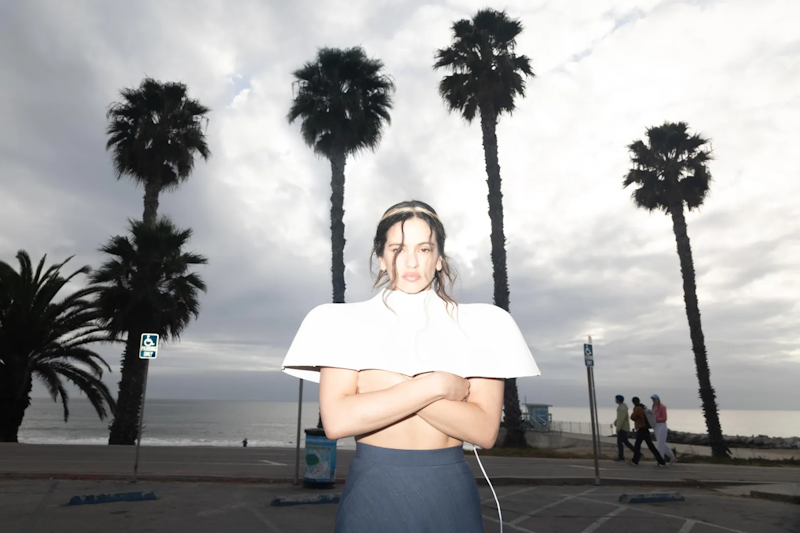French philosopher Simone Weil argued in Gravity and Grace that existence is ruled by two opposing laws. Gravity, which binds us to earthly needs—the ego, pain, the dense matter of the world—and grace, the rare counterforce that defies it, a weightless energy arriving only when the self yields—not to lift us out of suffering, but to embroider light through it. To live between these laws is to know that salvation isn’t escape, but transformation. Even if you don’t believe, it’s hard not to see God as some form of a stalker, as faith becomes inescapable almost by design. Sixty-five nations invoke him in their anthems; the Old Testament is a source of inspiration for Western literature and art; while never the star on camera, he’s still arguably the most recurring character in pop culture. When faced with enough crises of the heart and soul, even the skeptic might find prayer reasonable—and if you’ve seen enough movies, you already know how to. Spiritual longing has long served as an artistic vessel to examine tortures such as romantic love, even for those who aren’t religious. So when Rosalía, on the opening of her new album LUX, asks, “How nice it’d be to come from this earth, go to heaven, and come back to Earth?” there’s the question if we’re listening to a confession, or a statement of intent.
Recorded over two years with the London Symphonic Orchestra and structured in four “movements” like a traditional concerto, LUX finds the flamenco prodigy–turned–pop phenom performing in 13 languages, each representing a female martyr drawn from extensive research of their respective hagiographies. It’s an ambitious use of major-label resources to stage an exercise in academic rigor against pop’s sensibilities—fitting for an artist whose college thesis reimagined the Romance of Flamenca, widely considered the first modern novel, as the framework for an album that helped propel flamenco, and herself, to the global stage. Her last offering, 2022’s Motomami, fused Caribbean musical stylings such as reggaeton, merengue, and bolero into a minimalist meditation on fame—resulting in controversy over whether or not a Spaniard could crib off island cultures from which were once colonized by the Europeans. LUX charges ahead on those same ethical gray areas of artistic curiosity in a rapidly globalizing zeitgeist—while now dripping in maximalist excess—in the efforts of digging up divinity out of the wreckage of heartbreak.
The album explores a new collection of global styles: La Perla is a regal waltz juxtaposed with scorned lyrics inspired by the anthems of disparaged lovers in regional Mexican music; Dios Es Un Stalker is a sultry mambo of voyeuristic obsession from the perspective of a not-so-benevolent God, that slowly bursts at the seams; and Memória sees her take stock of what’s remembered and forgotten in how we recount the past, while on the path toward spiritual emptying in a haunting Portuguese fado. Porcelana, on the other hand, experiments with abstract strokes of hip-hop against classical textures that hopscotch between Kanye West and Björk. Here she raps in Japanese, referencing Ryōnen Gensō, a 17th-century woman who burned her face to erase her beauty to be taken seriously by the temple she was rejected from; she’d later become an abbess, performing an act of what Simone Weil described as decreation—a voluntary unmaking of the self that bound her to worldly perception. In Weil’s terms, this was the moment gravity gave way to grace: by consenting to effacement, she made herself weightless, open to the divine. Her disfigurement wasn’t self-hatred but surrender—a refusal of self-possession so complete it became a form of spiritual freedom.
Mio Cristo Piange Diamante, an Italian aria composed and written over a year by Rosalía, speaks of paradoxical love, one of reciprocal inspiration and mystical companionship that supersedes carnal urges. The song takes inspiration from Saint Clare of Assisi, who, moved by Francis’ radical faith, abandoned her earthly possessions and built a life of devotion alongside him in poverty—a bond defined not by romance but by love that transcended it. Rosalía’s use of this history as metaphor, and her operatic technique modeled on Maria Callas, results in a pièce de résistance about how this love, which blurs the line between affection and adoration can be how she touches the sky, yet still requires a renunciation of self—where desire becomes both wound and cure. “My dear friend, we can neither choose this love, nor let it fall. My dear friend, with you gravity is graceful and grace is grave.” Like Weil, she understands that what shatters us might also make us vessels for grace.
In the end, LUX revels in that same contradiction —love as gravity and grace, crucifixion and communion. Like Gensō’s act of decreation or Clare’s vow of poverty, Rosalía, though not a Christian, resides within a world that made the Catholic Church the dominant tongue of the planet’s means of spirituality; her songs turn longing into a form of surrender, a stripping down of the self until only devotion remains. It’s a vision of love that resists resolution: the kind that wounds and redeems in the same breath, where the ache becomes proof of the divine. That’s tradition: it finds its way in.

